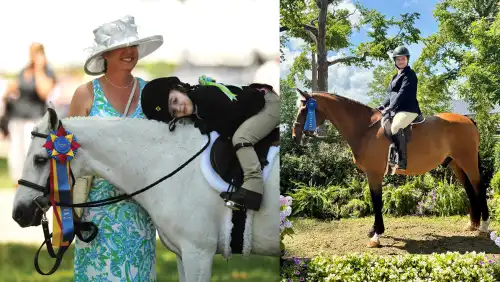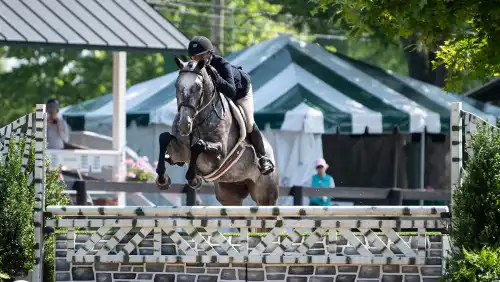You’re not the only one. GR1306 is so tricky even stewards go running for their USEF Rule Books when you mention it.
Wander back to the barns after any amateur class in the country, listen long enough and you’ll hear it: an annoyed accusation that one of the competitors shouldn’t have been in the division.
What began as a class for part-time equestrians who didn’t make a living riding horses has morphed into a division unto itself and now includes riders just as skilled as many professionals.
Particularly in the hunter/jumper competitions, the advantages of competing in amateur divisions (prize money, qualifying for major horse shows, zone and national awards, to name a few) have created a pool full of full-time and part-time riders, and inevitably there’s plenty of consternation about who, exactly, should be allowed in the club.
For better or worse, amateur status is determined by how a U.S. Equestrian Federation member earns his or her income. It’s not a reflection of one’s skills, experience or time spent in the saddle.
The USEF Rule Book lays out extensive guidelines as to which riders are eligible for amateur status in GR1306 (read the amateur rule here). Despite the attempt to make the distinction between amateurs and professionals as black and white as possible, there’s still a choppy gray river running through the middle of GR1306 that’s easy to get sucked into.
“The rule as it’s written is extremely confusing,” said U.S. Hunter Jumper Association President Bill Moroney. “If we could take the rule and re-write it and put it in bullet-point format for exactly what you can and cannot do it would be much easier to understand.”
Navigating The Labyrinth
Thanks to last year’s rule change bringing the eventing amateur rule in line with the general rule (see USEF Rule Change Brings Eventers Amateurs Back Into The Fold), the amateur rule now applies universally across USEF disciplines. In dressage, however, one applies for an amateur card at 22, rather than 18, and reining categorizes competitors based on a “pro” and “non pro” status rather amateur status. Also, those who plan to compete in amateur-owner classes should be aware of the special guidelines that apply (see “Amateur-Owner Pitfalls“).
Although he admitted that the amateur rule isn’t as big of an issue in the eventing community as it is for hunters and jumpers, Malcolm Hook, chairman of the USEF Eventing Committee and a member of the Steward-Technical Delegate Committee, cautioned eventers to take a good hard look at the rule, especially in light of the eventing amateur rule change.
“Many eventers say, ‘I feel like an amateur,’ rather than complying exactly with the wording of the rule,” he said. “But they can get themselves into a little bit of trouble these days if they’re not careful.”
One of the slippery slopes in the rule lies in the definition of remuneration. For the purposes of GR1306 the term includes cash paid under the table, board, training or other services exchanged as payment. So just because you aren’t receiving a formal paycheck for riding or teaching doesn’t mean you aren’t in violation.
So-called working students, whose duties often include riding sales and young horses, navigate this gray area on a regular basis.
ADVERTISEMENT
Beverly Bedard, a 42-year veteran show steward and co-chairman of the Steward-Technical Delegate Committee, deems working student questions the most difficult to answer, and she often passes the inquiry along to the USEF rather than offering an inaccurate response.
According to Bedard, another common pitfall lies in familial relationships. Spouses, parents and children of professionals may not show horses for which their relation is earning an income.
“Generally you see that bigger names are very careful,” said Bedard. “For example, the amateur who is married to the well-known professional is very careful just to ride horses in her own name. People who don’t show all of the time probably don’t think about it as much. They think just because they aren’t getting paid it’s all right.
“Most amateurs, with very few exceptions, really pay attention and follow the rules down to the final comma and period,” she continued. “Generally speaking, people are very aware of the rule, but at the smaller shows sometimes people don’t read the rules.”
Heather Irvine sits on the USEF Licensed Officials and Hunter committees and runs Hillside Farm in Bloomfield Hills, Mich. As the trainer with a barn filled with mostly adult students, Irvine empathizes with working amateurs who find the practical implications of the amateur rule demanding on the pocketbook. But one of the biggest pieces of advice she offered for them is to be circumspect about their behavior all of the time and remember the importance of perception.
“Amateurs need to be amateurs when they’re at home and at shows,” she said. “Don’t teach lessons, even to help your trainer out briefly. The perception isn’t good. At my barn, there are three different trainers. If I have an amateur watch a student jump, they’re going to notice.”
Status Woes
One may relinquish amateur status at any time, and there are two ways to lose it. Any individual—it needn’t be a USEF member—may file a protest against you if he or she suspects you of being in violation (see our CliffsNotes version of how to protest). It’s also possible, though much less common, for a USEF competition official or the USEF Executive Director or USEF CEO to file a charge against you. The USEF Hearing Committee rules on any protest or charge.
The USEF’s Regulation Department handles complaints about alleged amateur rule abuses, and they hear plenty. But don’t expect miracles: the department isn’t equipped to aggressively investigate most amateur violations. If you really want to out an illegitimate amateur, your best bet is to file a formal protest.
“We follow up on every single complaint,” said Regulations Department Director Emily Patrick. “But most of the calls come from people who want to remain anonymous because they’re afraid of retaliation or what people will think. It’s hard to find enough documentation for us to move forward and penalize someone when the accuser stays anonymous.”
At the local and national levels, the USEF has recently adopted an instructive rather than hard-line attitude toward those accused without a formal protest. If Patrick receives an anonymous phone call and she can’t find documentation against the accused, she sends a letter to the accused explaining the rule and discussing the problem of giving the perception of being a professional.
Bedard often hears such accusations at horse shows from individuals who don’t wish to file a formal protest and can’t provide proof of the violation. Her strategy is to speak directly with the person in question, explain that she’s received an anonymous complaint, ask a few questions, then urge the individual to surrender amateur status if the complaint is true.
“Some members believe the rules are confusing,” said Patrick. “We want to try to educate the member as much as we can and help them understand the rules.”
ADVERTISEMENT
Moroney urges those individuals operating in the gray area of the amateur rule to put themselves in the shoes of their competitors.
“Even at the grassroots level people taking advantage of the rule diminishes the sport,” said Moroney, Middleburg, Va. “Maybe you’re teaching lessons and going to A-rated shows and you’re not winning, but you go to B- and C-rated shows and are trouncing all the true amateurs. At some level you’re going to be successful and taking advantage of the situation over another amateur. What would you tell your students if they were beaten by someone in your situation? Even though the hunter/ jumper world has become an industry, there are portions that are still about sportsmanship, and the amateur rule is one of them.”
To this end Moroney proposes increasing the punishment as a deterrent against violating the amateur rule.
“Right now if you have a situation where a horse comes up with two NSAIDS and tests positive for a third in a trace amount, that situation is treated just about as severely as falsifying amateur status,” he said. “Amateur status affects [USEF] horse of the year awards, zone awards, prize money, the integrity of the person and of the whole system. Every year when you sign your membership form you’re submitting a signed, sworn statement that you aren’t violating the rule. Lying about that is a lot different, to me, than a swapped feed bucket.”
Am I OK?
While a steward at a competition should always be a competitor’s liaison to the USEF, if you’re operating anywhere near the gray area of the amateur rule be sure to have your ducks in a row before you load your horse on the trailer.
“The best thing to do is contact the USEF and ask if there’s someone there to review the situation,” said Hook. “They’ve got a group of people there…who are really good at getting you to the right person.”
That person is in the Regulation Department.
That group toils exclusively with the amateur rule. While the Hearing Committee has the final say about whether a protested individual is in compliance, the Regulation Department knows all of the committee’s past rulings and reviews all amateur inquiries. They can offer advice—though not a binding opinion—as to whether you’re in compliance.
The regulation department will not review your individual situation on the phone. All amateur inquiries must be presented in writing, and the easiest way to receive a prompt response is to e-mail the regulation department at amateurinquiry@usef.org.
“If you have any doubts, it’s always best to come to us and ask us; don’t depend on your friend,” said Patrick. “Having something in writing will be helpful to you.”
Like This Article?
If you enjoyed this article and would like to read more like it, consider subscribing to The Chronicle Of The Horse. “Confused About Amateur Rules” was the lead article in the Nov. 13 Amateur Issue. Check out the table of contents to see what great stories are in this week’s magazine.















